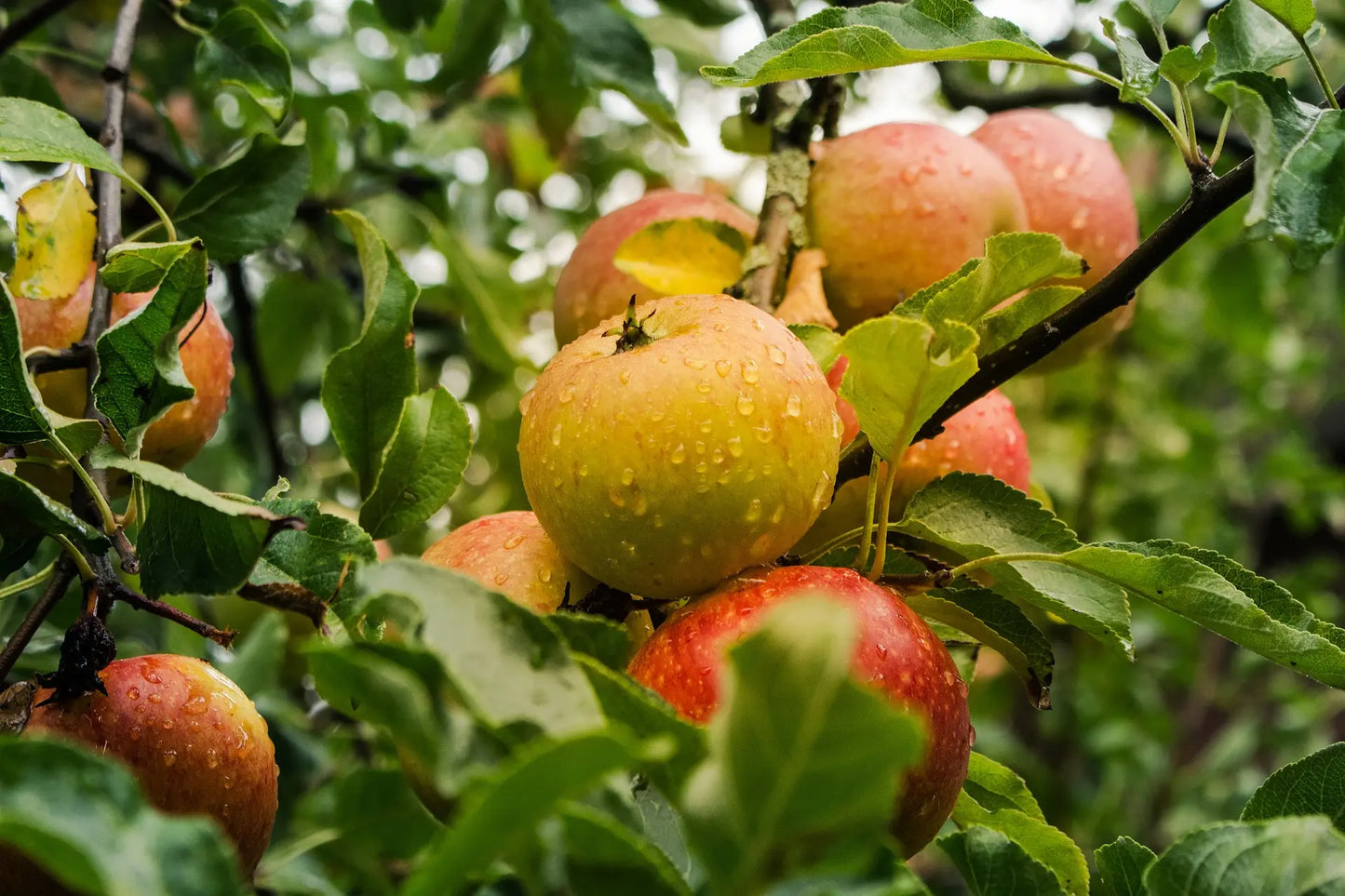-
Delivery from 10 plants to France, Switzerland and Europe
Delivery method -
Fruit Tree Wholesale Supplier
About Us -
Quality Fruit Tree Plants
Technical itinerary
Chataignier Apple Half-Standard Tree 6-8 cm diameter bare-root
Chataignier Apple Half-Standard Tree 6-8 cm diameter bare-root
The prices shown are our base prices for large volumes. Depending on the quantity ordered and the producers’ pricing scales, the rate may be adjusted upward. Each quote is personalized to ensure you receive a fair price.
Mini order 10 units / Multiple orders 10 units (FRS202412002)
Couldn't load pickup availability
 Buy now and get it delivered when you're ready to plant - Add your desired date to your quote request
Buy now and get it delivered when you're ready to plant - Add your desired date to your quote request
- Delivery from 10 plants to France, Switzerland and Europe

Technical sheet of the Chestnut Apple variety
- Fruit flesh color: White, slightly yellowish, thin, crisp, moderately juicy, moderately sweet and slightly fragrant.
- Skin color: Greenish yellow with red streaks.
- Size and shape: The fruits are of medium size. They are spherical, slightly flattened at the base, sometimes ovoid-rounded.
- Tree Size: The available information does not mention the specific size of the tree.
- Fruit maturity: The Chestnut Apple tree is a late variety, with maturity between November and March.
- Fruit Taste: The flesh is white, slightly yellowish, thin, crisp, moderately juicy, moderately sweet and slightly fragrant.
- Earliness of the variety: The Chestnut Apple variety is considered semi-early to early, but it is often classified as late due to its late flowering and maturity.
- Fruiting period: The fruits of the Chestnut Apple tree are harvested before the first frosts, generally in November or December, and can be stored until March or April.
- Disease resistance and storage: This variety is very resistant to disease. Chestnut apples can be eaten as soon as they are harvested in November-December and can be stored until March-April under optimal conditions.
- Variety Yield: Expected yields for apple trees are generally 220 kg per tree, with a range of 180 to 250 kg per tree.
- Is this variety self-fertile? The Chestnut Apple tree is classified as a self-fertile variety, meaning it produces few or no fertile seeds and therefore requires the presence of other semi-late flowering apple trees to ensure pollination.
- Commercial Use: Chestnut apples are ideal for cider production, but they can also be eaten raw or cooked. They are ideal for making ice cream, syrup, and jam.
- Is it a PVP variety? To determine if the variety is covered by a Plant Variety Certificate (PVC), you must check the lists of protected varieties at national and community level.
- Comments: The Chestnut Apple Tree is a very old variety and has been present in Normandy since the 13th century. It is particularly recommended at high altitudes and can be planted in the shade.
Quick reading / the essentials on Pommier Châtaignier
The Chestnut apple tree is an old and robust variety that attracts growers thanks to its disease resistance , high productivity and exceptional longevity . Its medium-sized fruit has a yellow skin with red stripes and a crisp, moderately juicy flesh, with a perfect balance between sugar and acidity. It is mainly grown for cider production, although its culinary versatility also allows it to be eaten fresh or cooked.
To ensure optimal production, it is essential to source from a specialist apple tree wholesale supplier to ensure impeccable genetic quality and good yields. Thanks to its late flowering in April, this variety is relatively resistant to spring frosts, making it an asset for growers in regions with harsher climates.
One of the main advantages of the Chestnut apple tree is its ability to adapt to various soil types, with a preference for well-drained, slightly acidic or calcareous soils. It thrives in sunny conditions but also tolerates cultivation at high altitudes. Its robustness and long fruit storage period (until March-April) offer excellent profitability to orchardists wishing to extend their marketing period.
To optimize fruiting, it is recommended to associate this variety with other pollinating apple trees such as Royal Gala , Golden Delicious or Reinette du Mans . In terms of rootstocks, the choice varies according to the density of the orchard and the management of the trees, with suitable options such as M9, M26 or seed francs .
If you want to buy Chestnut apple tree plants , trust a specialist apple tree plant wholesaler . You will benefit from expert support , technical advice and a supply of high-quality plants, optimized for efficient production. Buying Chestnut apple tree plants from a professional guarantees better adaptation to local conditions and an abundant and lasting harvest.
Presentation of the Chestnut Apple Tree for Apple Growers in France
The Chestnut apple tree is an ancient variety originating from Normandy , dating back to 1200 , renowned for its great hardiness, high productivity and adaptability . It is mainly cultivated for the production of apples for cider , but its fruits can also be eaten raw or cooked .
Fruit characteristics
The apples of the Chestnut apple tree are of medium size , with a spherical shape slightly flattened at the base , sometimes ovoid-rounded . Their greenish-yellow skin is streaked with red , giving the fruit an attractive appearance.
The flesh is white to slightly yellowish, thin and crisp , with a moderately juicy texture and a balanced flavor between sweetness and acidity . It gives off a light aroma that makes it interesting for various culinary uses.
Thanks to their good preservation , these apples can be stored until March-April , thus allowing extended marketing.
Flowering period and maturity
The Chestnut apple tree flowers late in April , which generally protects it from spring frosts .
The fruits ripen in October and can be harvested until January . They are edible as early as November-December , although their flavor develops and improves over time.
Yield and production
This variety is particularly productive , with an average harvest estimated between 180 and 250 kg per tree , or approximately 220 kg per adult subject .
The Chestnut apple tree is, however, self-sterile , requiring the presence of other semi-late flowering varieties such as Royal Gala, Golden Delicious or Reinette du Mans to ensure effective pollination.
Growing conditions and adaptation to the soil
The Chestnut apple tree is a vigorous tree, capable of adapting to various types of soil . However, it prefers slightly calcareous or acidic soil , well drained, without excess moisture.
A sunny exposure is recommended, although it can also tolerate cultivation at altitude or in shade .
Thanks to its exceptional hardiness , it withstands difficult climatic conditions well and is an interesting choice for producers located in regions with harsh winters .
Resistance to diseases and parasites
The Chestnut apple tree is very resistant to diseases , making it an ideal option for orchards with low phytosanitary intervention .
No specific information is available regarding its resistance to pests , but as with any fruit crop, monitoring for aphids, codling moths and other pests remains recommended.
Recommended rootstocks
The choice of rootstock depends on the growing conditions and the desired training form.
- Seedless varieties such as Bittenfelder, Rose de Benauge and Reinette du Mans are often preferred for their vigor and disease resistance .
- M9 and M26 are rootstocks suitable for denser orchards and low-stem cultivation .
- A vigorous rootstock is preferable for apple trees trained on high stems or in the open air , while a more moderate rootstock is suitable for intensive orchards .
Uses and commercial outlets
The Chestnut apple tree is a variety traditionally used for the production of cider , thanks to its balance between sugar and acidity which gives the juices a good aromatic complexity .
However, its fruits can also be eaten raw or incorporated into various culinary preparations such as pies, compotes and donuts .
Its long shelf life makes it a profitable option for producers , who can spread their sales over several months .
Tree maintenance and management
To ensure good development, it is recommended not to bury the graft ring when planting.
Staking may be necessary for young trees, especially when exposed to strong winds.
Regular pruning helps maintain a good balance between vegetative growth and fruiting, while limiting the appearance of diseases.
Conclusion
The Chestnut apple tree is a historic and versatile variety , suitable for cider production as well as for fresh consumption or cooking .
Thanks to its great hardiness, high productivity and resistance to diseases , it constitutes a strategic choice for producers wishing to combine profitability and ease of cultivation .
To summarize: Apple tree Chestnut tree
The Chestnut apple tree is distinguished by its natural robustness , high productivity and versatility of use , particularly for cider. Its average yield of 180 to 250 kg per tree makes it a particularly interesting variety for producers wishing to maximize their profitability while limiting phytosanitary treatments thanks to its good resistance to diseases.
Thanks to its long shelf life and evolving flavor after harvest, this variety offers a wide range of opportunities, from processing into juice and cider to selling fresh fruit. Its late flowering protects the buds from spring frosts, and its ability to adapt to well-drained soils and varied climates makes it a strategic choice for French fruit growers.
To obtain robust and well-acclimated plants, it is essential to choose a wholesale supplier specializing in apple trees . This guarantees vigorous plants, appropriate technical monitoring and optimal varietal selection . In addition, purchasing Chestnut apple trees from a specialist ensures effective pollination by combining the best compatible varieties.
If you are an apple grower in France and are looking for a reliable and high-performance variety, do not hesitate to buy Chestnut apple trees from a specialist apple tree plant wholesaler . This approach will guarantee you a profitable, sustainable operation adapted to market requirements .
-
Chataignier Apple Scion bare-root organic
Regular price €11,60 EURRegular priceUnit price / per -
Chataignier Apple Scion bare-root
Regular price €8,50 EURRegular priceUnit price / per -
Chataignier Apple Half-Standard Tree 8-10 cm diameter bare-root
Regular price €23,50 EURRegular priceUnit price / per -
Chataignier Apple Half-Standard Tree 6-8 cm diameter bare-root
Regular price €22,00 EURRegular priceUnit price / per -
Chataignier Apple Half-Standard Tree 10-12 cm diameter bare-root
Regular price €24,50 EURRegular priceUnit price / per



